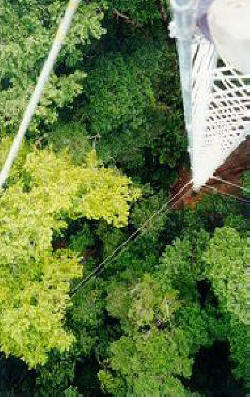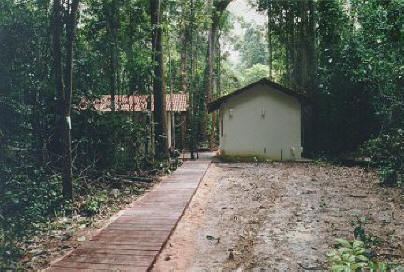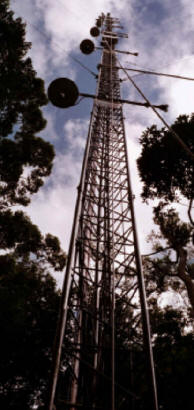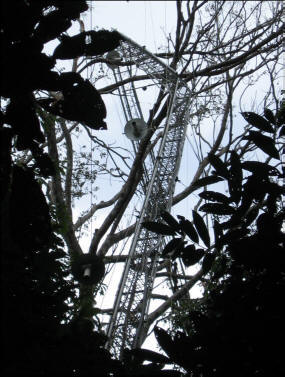Get Data
Summary:
This data set contains a single text file that reports eddy flux measurements of CO2 and H2O exchange and associated meteorological measurements at the Pará Western (Santarém) - km 67, Primary Forest Tower Site. This site is in the Tapajos National Forest located in north central Brazil. Measurements extend from January 2002 through January 2006 .
Eddy fluxes of CO2 and H2O were measured at two levels (58m and 47m) using tower-mounted closed-path Licor 6262 gas analyzers and Campbell CSAT3 sonic anemometers (Figure 1). Eddy-flux measurements were made at a sampling rate of 8 Hz and averaged over a 1 hour interval. A comprehensive set of meteorological parameters (air temperature, pressure, PAR, net radiation, precipitation, etc) were also measured.
Co-located measurements included a third Licor gas analyzer that measured (a) the CO2 and H2O concentration profiles at 8 levels in and above the canopy (1 level every 2 minutes) and (b) the instantaneous integrated canopy storage of CO2 and H2O, using a design that pulled air simultaneously through all 8 inlets (once every 20 minutes). See related data sets.
With the permission of the author, Hutyra, L.R. 2007. Carbon and water exchange in Amazonian rainforests. Ph.D. Thesis, Department of Earth and Planetary Sciences, Harvard University, Cambridge, Massachusetts., is included as a companion file.



Figure 1. The Pará Western (Santarém) - km 67, Primary Forest Tower Site: tower with profile inlets; climate controlled instrument shelter; and view from tower
Data Citation:
Cite this data set as follows:
Hutyra, L., S. Wofsy and S. Saleska. 2008. LBA-ECO CD-10 CO2 and H2O Eddy Flux Data at km 67 Tower Site, Tapajos National Forest. Data set. Available on-line [http://daac.ornl.gov] from Oak Ridge National Laboratory Distributed Active Archive Center, Oak Ridge, Tennessee, U.S.A. doi:10.3334/ORNLDAAC/860
Implementation of the LBA Data and Publication Policy by Data Users:
The LBA Data and Publication Policy [http://daac.ornl.gov/LBA/lba_data_policy.html] is in effect for a period of five (5) years from the date of archiving and should be followed by data users who have obtained LBA data sets from the ORNL DAAC. Users who download LBA data in the five years after data have been archived must contact the investigators who collected the data, per provisions 6 and 7 in the Policy.
This data set was archived in May 2008. Users who download the data between May 2008 and April 2013 must comply with the LBA Data and Publication Policy.
Data users should use the Investigator contact information in this document to communicate with the data provider. Alternatively, the LBA Web Site [http://lba.inpa.gov.br/lba/] in Brazil will have current contact information.
Data users should use the Data Set Citation and other applicable references provided in this document to acknowledge use of the data.
Table of Contents:
- 1 Data Set Overview
- 2 Data Characteristics
- 3 Applications and Derivation
- 4 Quality Assessment
- 5 Acquisition Materials and Methods
- 6 Data Access
- 7 References
1. Data Set Overview:
Project: LBA (Large-Scale Biosphere-Atmosphere Experiment in the Amazon)
Activity: LBA-ECO
LBA Science Component: Carbon Dynamics
Team ID: CD-10 (Wofsy / Kirchhoff)
The investigators were Munger, J. William; Daube, Bruce C.; Wofsy, Steven C.; Saleska, Scott R. and Hutyra, Lucy . You may contact Saleska, Scott Reid (saleska@email.arizona.edu) ; Wofsy, Steven C (scw@io.harvard.edu) ; Hutyra, Lucy (lrhutyra@u.washington.edu) and Gottlieb, Elaine W. (gottlieb@deas.harvard.edu)
LBA Data Set Inventory ID: CD10_Flux_km67_Tower_Tapajos
Eddy flux measurements of CO2 and H2O exchange and associated environmental measurements at the km 67 flux tower sites, Tapajos National Forest, Santarem, Para, Brazil. Measurements extend from January 2002 - January 2006.
These data may be updated or reprocessed from time to time, and it is the user's responsibility to insure that you have the most recent version of the data. For the latest version, please see the following web site: Harvard University, LBA Web Page (http://atmos.seas.harvard.edu/lab/data/lbadata.html) .
Related Data Sets:
LBA-ECO CD-10 H2O Profiles at km 67 Tower Site, Tapajos National Forest
LBA-ECO CD-10 CO2 Profiles at km 67 Tower Site, Tapajos National Forest
2. Data Characteristics:
The flux and meteorological data are reported in one comma separated ASCII text file, km67_eddyflux_2002_2006.txt .
Data File Documentation:
|
column variable description 1 "hours" Hour of measurement (GMT, continuous from 1/1/00) 2 "JDstart.GMT" Decimal day (GMT, continuous from 1/1/00) NOTE 1: Tapajos Forest Local time (LT) = GMT - 4 hours NOTE 2: these times are time at the BEGINNING of the hour-long data aggregation interval, i.e., data at 12:00 are from aggregating measurements between 12:00 and 13:00 3 "ws" Sonic wind speed, rotated u (m/sec, @ 57.8 m) 4 "wdir" Wind direction (degrees (0 - 360 degrees)) 5 "Tamb" Ambient temp at 58m (level 1 eddy) from chilled mirror sensor (deg C) 6 "Tdew" Ambient dew point temperature @ 58m (deg C) 7 "Tson" Sonic temp (deg C, unadjusted for moisture @ 57.8m) 8 "Tasp" Distance weighted aspirated ambient temperature from thermistors (deg C) 9 "fheat" Heat flux (deg C m/sec) 10 "fmom" Momentum flux (m2/sec2) 11 "co2" CO2 concentration (mmol/mol) 12 "fco2" Eddy flux of CO2, (umol/m2/sec) [relative to dry air] 13 "h2o.mmol.m" H2O concentration (mmol/mol) 14 "fh2o" Eddy flux of H2O (mmol/m2/sec) [relative to dry air] 15 "h2o.mix" Mixing ratio (g H2O/kg (dry) air) 16 "Pamb.Pa" Ambient pressure (Pascals) 17 "H" Sensible heat flux (W/m2) 18 "LHdry" Latent heat flux (W/m2) [relative to dry air] 19 "ustar" Friction velocity, sqrt(-<w*u>) (m/sec), where w,u are the rotated wind components 20 "ppm2umol" Density conversion factor for fluxes (mol/m3) [relative to dry air] 21 "compiler" Which fortran compiler was used in processing [IDs ed1 vs. ed2] 22 "NetRad" Net Radiation @ 64.1 m (W/m2, corrected) 23 "sNetRad" Std deviation on hourly mean of NetRad 24 "par" PAR (umol/m2/sec) level 1 (63.6 m) 25 "sPAR1up" Std deviation on hourly mean of par 26 "PAR2up" PAR (umol/m2/sec) level 2 (15.09 m) 27 "sPAR2up" Std deviation on hourly mean of PAR2up 28 "PAR1dn" Downward PAR (umol/m2/sec) level 1 (63.6 m) 29 "sPAR1dn" Std deviation on hourly mean of PAR1dn 30 "Tair1" Temp (via thermistor) at profile level 1 (61.94 m) (deg C) 31 "Tair2" Temp (via thermistor) at profile level 2 (49.75 m) (deg C) 32 "WS1" Wind speed, Cup anemometer #1 (m/sec, 64.1 m) 33 "sWS1" Std deviation on hourly mean of WS1 34 "rain" Precipitation (mm in each hour) (tipping bucket @ 42.6m) 35 "co2col.wt" Mean column CO2 concentration (ppm) 36 "storage.wt" Storage flux (umol/m2/sec) below this level = d/dt (CO2 column avg) based on a discrete integral approach using the profile concentration measurements 37 "nee.wt" NEE (umol/m2/sec) = fco2 + storage.wt 38 "T.filled" Filled temperature for level 1 (filled Tasp). Filled based on adjusted temperature measurements from the Jamaraqua met. station (-2.80639, -55.03639). Data courtesy of D. Fitzjarrald (SUNY Albany) 39 "GMT" GMT time of day 40 "yr" Year 41 "NEE" Integrated NEE (umol/m2/sec) [filtered and integrated across gaps], see status for filling information [u*>0.22] 42 "R" Respiration based on nighttime NEE with u*>0.22 m/s (umol/m2/sec) see status for filling information 43 "GEE" Gross Ecosystem Exchange (umol/m2/sec) see status for filling information 44 "R.light" Respiration based on light-curve interpolation to 0 PAR (umol/m2/sec) 45 "stg.filled" Filled storage (umol/m2/sec). This storage estimate has also been balanced to 0 on 5 day intervals. 46 "par.filled" Filled PAR timeseries (umol/m2/sec) see par.status for filling codes 47 "par.status" Status 0 = unfilled data, measured with Wofsy sensor Status 1 = filled based on relation between Wofsy PAR sensor & Wofsy NetRad sensor over 10 day intervals Status 2 = filled based on relation between D. Fitzjarrald PAR sensor & Wofsy NetRad sensor over 10 day intervals Status 3 = filled based on lookup table for a composite year, based on entire time series. 48 "NetRad.filled" Filled NetRad timeseries (W/m2), see NetRad.status for filling codes 49 "NetRad.status" Status 0 = unfilled data, measured with Wofsy sensor Status 1 = filled based on relation between Wofsy PAR sensor & Wofsy NetRad sensor over 10 day intervals Status 2 = filled based on relation between D. Fitzjarrald PAR sensor & Wofsy NetRad sensor over 10 day intervals Status 3 = filled based on lookup table for a composite year, based on entire time series. 50 "hr.2" Hour of the day (GMT) 51 "Status" 6-bit status word to describe what, if any, filling technique was used on the NEE, R, and GEE data bit value description 0 1 u* < 0.22 or u* = NA; NEE = R + GEE 1 2 no PAR; PAR filled from lookup table for GEE calculation 2 4 no Tair available; filled in from Jamaraqua for R calculation 3 8 No measured NEE available; filled in with R+GEE 4 16 R calculated, not measured (daytime & calm nights) 5 32 Storage gap of >= 5 days; filled w/mean storage value Missing value
code is "NA"
|
Sample Data Records:
All of the flux and meteorological data are reported in km67_eddyflux_2002_2006.txt.
|
hours,JDstart.GMT.,ws,wdir,Tamb,Tdew,Tson,Tasp,fheat,fmom,co2,fco2,h2o.mmol.m.,fh2o,
17610,733.75,1.95,179.804,29.183,23.13,32.475,29.079,0.043,-0.227,394.86,NA,30.834,4.402,
17611,733.792,2.226,274.378,27.888,24.574,31.531,27.906,0.052,-0.197,377.74,-6.896,32.106,1.562,
17612,733.833,1.856,275.332,28.21,24.312,31.909,28.337,0.022,-0.114,376.175,-3.952,31.252,1.011, ... **Line Breaks Added to Improve Readability |
Site boundaries: (All latitude and longitude given in degrees and fractions)
| Site (Region) | Westernmost Longitude | Easternmost Longitude | Northernmost Latitude | Southernmost Latitude | Geodetic Datum |
|---|---|---|---|---|---|
| Para Western (Santarem) - km 67 Primary Forest Tower Site (Para Western (Santarem)) | -54.959 | -54.959 | -2.857 | -2.857 | World Geodetic System, 1984 (WGS-84) |
Time period:
- The data set covers the period 2002/01/01 to 2006/01/18.
- Temporal Resolution: 1 hour
Platform/Sensor/Parameters measured include:
- TOWER / IRGA (INFRARED GAS ANALYZER) / CARBON DIOXIDE
- TOWER / IRGA (INFRARED GAS ANALYZER) / WATER VAPOR
- TOWER / EDDY CORRELATION APPARATUS / CARBON DIOXIDE
- TOWER / EDDY CORRELATION APPARATUS / WATER VAPOR
- METEOROLOGICAL STATION / RAIN GAUGE / PRECIPITATION AMOUNT
- TOWER / SONIC ANEMOMETER / SURFACE WINDS
- TOWER / EDDY CORRELATION APPARATUS / HEAT FLUX
- METEOROLOGICAL STATION / RADIOMETERS / SOLAR IRRADIANCE
- FIELD INVESTIGATION / ANALYSIS / PRIMARY PRODUCTION
3. Data Application and Derivation:
Eddy flux and associated environmental measurements.
4. Quality Assessment:
This data set can be considered final, but as always with data sets this large there are occasional individual points that are bad, but which for one reason or another, have not yet been removed.
These data are subject to ongoing error-correction and quality-assurance testing, and are subject to change.
5. Data Acquisition Materials and Methods:
A 64 m tower (Rohn 55G, Peoria, IL) was instrumented for eddy covariance measurements which commenced in April, 2001 and continued until the tower was destroyed when a falling tree hit the guy wires in January 2006 (Figure 2). Three modular enclosures (approximately 1m x 0.6 m x 0.2 m) containing all the key instruments and dataloggers were mounted on the tower to keep inlet tubes short (~ 2 m). Eddy-flux measurements were made at two levels (58m and 47m) with a sample rate of 8 Hz. A 3-axis sonic anemometer (CSAT-3, Campbell Scientific, Logan UT) was mounted with the air sample inlet located 20 cm from the anemometer. The flux system drew sample air from the inlet through a 50 mm diameter Teflon filter and 9.5 mm (inner diameter) Teflon PFA tubing to a closed-path infrared gas analyzer (IRGA, LI-6262, Licor, Lincoln, NE). The eddy system sample cell (11.9 cm3) was pressure-controlled at 66.6 kPa with a mass flow rate of 6000 sccm, providing a cell-flushing time of 0.078 s. This system design maintains the advantages of the closed-path sensor (e.g. precise instrument calibration, constant pressure and temperature), while also adding some of the advantages (e.g. minimal attenuation of high-frequency fluctuations) attributed to open-path designs. This system is particularly suitable for deployment with very tall vegetation where problems accrue due to long sample-tubes from the top of the tower.
Calibrations of the eddy system for CO2 were made every 6 hours (April 2001 - November 11, 2002 & March 29, 2003 - November 15, 2003) or 12 hours (November 12, 2002 - March 29, 2003; November 15, 2003 - January 24, 2006 ) using 325, 400, and 475 ppm CO2 standard gases. The instrument was zeroed every 2 hours. The long-term accuracy of the instruments was ensured by measuring a surveillance standard (traceable to NOAA/CMDL standards at 380.45 ppm) once per week, this tank lasted through the duration of the measurements. Calibrations for water vapor were made using the daily fluctuations of Tv - Tk, where Tv is the sonic temperature (related to the speed of sound provided by the sonic anemometer) and Tk is the ambient temperature. This approach was necessary due to failures in the chilled mirror hydrometers originally installed for this purpose (see Hutyra et al, 2007).

Figure 2. Tower measurements started in April, 2001 and continued until the tower was destroyed when a falling tree hit the guy wires in January 2006.
Co-located Measurements: (See Related Data Sets)
Vertical profiles of CO2 and H2O concentrations were measured at 8 levels on the tower (62.2, 50, 39.4, 28.7, 19.6, 10.4, and 0.91m). Sample air was drawn at 1000 sccm through the 8 profile inlets in sequence (2 minutes at each level). The profile concentration data were used to estimate the change in vertical average concentration between the ground and flux measurement height in order to calculate the column average storage of CO2. The profile IRGA was zeroed between each profile sequence and an absolute calibration at 325, 400, and 475 ppm CO2 was made every 6 or 12 hours, as for the eddy CO2 measurements.
A suite of environmental measurements was also made on the tower. Dataloggers (CR-10X, Campbell Scientific, Logan, UT), controlled the overall operation of the system. The data were downloaded via coaxial cable to a computer, housed in a climate controlled hut near the tower.
Sensors used include:
- IRGA (INFRARED GAS ANALYZER)
- IRGA (INFRARED GAS ANALYZER)
- EDDY CORRELATION APPARATUS
- EDDY CORRELATION APPARATUS
- RAIN GAUGE
- SONIC ANEMOMETER
- EDDY CORRELATION APPARATUS
- RADIOMETERS
- ANALYSIS
6. Data Access:
This data is available through the Oak Ridge National Laboratory (ORNL)Distributed Active Archive Center (DAAC) or the EOS Data Gateway.
Data Archive Center:
Contact for Data Center Access Information:
E-mail: uso@daac.ornl.gov
Telephone: +1 (865) 241-3952
7. References:
Hutyra, L.R. 2007. Carbon and water exchange in Amazonian rainforests. Ph.D. Thesis, Department of Earth and Planetary Sciences, Harvard University, Cambridge, Massachusetts. With the kind permission of the author, this document is included as a companion file with this data set.
Hutyra, L. R., J. W. Munger, S. R. Saleska, E. Gottlieb, B. C. Daube, A. L. Dunn, D. F. Amaral, P. B. de Camargo, and S. C. Wofsy. 2007. Seasonal controls on the exchange of carbon and water in an Amazonian rain forest, J. Geophys. Res., 112, G03008, doi:10.1029/2006JG000365.
Saleska, S.R., Miller, S.D.,Matross, D.M., Goulden, M.L., Wofsy, S.C., da Rocha,H., de Camargo, P.B., Crill, P., Daube, B.C., de Freitas, H.C., Hutyra, L., Keller, M., Kirchhoff, V., Menton, M., Munger, J.W., Pyle, E.H., Rice, A.H, and Silva, H. 2003. Carbon fluxes in old-growth Amazonian rainforest: seasonality and disturbance-induced net carbon loss, Science, 302, 1554-1557.
Hutyra, L.R., Munger, J.W., Nobre, C.A., Saleska, S.R., Vieira, S.A., and Wofsy, S.C. 2005. Climatic variability and vegetation vulnerability in Amazonia, Geophysical Research Letters, 32, L24712.
Related Publications
-
Saleska, S.R., S.D. Miller, D.M. Matross, M.L. Goulden, S.C. Wofsy, H.R. da Rocha, P.B. de Camargo, P. Crill, B.C. Daube, H.C. de Freitas, L. Hutyra, M. Keller, V. Kirchhoff, M. Menton, J.W. Munger, E.H. Pyle, A.H. Rice, and H. Silva. 2003. Carbon in amazon forests: Unexpected seasonal fluxes and disturbance-induced losses. Science 302(5650):1554-1557.
-
Xiao, X.M., Q.Y. Zhang, S. Saleska, L. Hutyra, P. De Camargo, S. Wofsy, S. Frolking, S. Boles, M. Keller, and B. Moore. (2005) Satellite-based modeling of gross primary production in a seasonally moist tropical evergreen forest. Remote Sensing of Environment 94(1):105-122.
-
Hutyra, L.R., Munger, J.W., Nobre, C.A., Saleska, S.R., Vieira, S.A., Wofsy, S.C., Climatic variability and vegetation vulnerability in Amazonia, Geophysical Research Letters, 32, L24712, 2005.
-
Huete, A.R., Didan, K., Shimabukuro, Y.E., Ratana, P., Saleska, S., Hutyra, L.R., Yang, W., Nemani, R.R. and Myneni, R. Amazon rainforests green-up with sunlight in dry season, Geophysical Research Letters, 33, L06405, 2006.
-
Ichii, K., Hashimoto, H., White, M.A., Potter, C., Hutyra, L.R., Huete, A.R., Myneni, R.B., Nemani, R.R., Constraining rooting depths in tropical rainforests using satellite data and ecosystem modeling for accurate simulation of GPP seasonality, Global Change Biology, 13, 67-77, 2007.
- Hutyra, L. R., J. W. Munger, S. R. Saleska, E. Gottlieb, B.
C. Daube, A. L. Dunn, D. F. Amaral, P. B. de Camargo, and S. C. Wofsy.
2007. Seasonal controls on the exchange of carbon and water in an
Amazonian rain forest, J. Geophys. Res., 112, G03008,
doi:10.1029/2006JG000365.